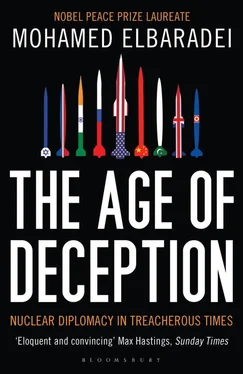Given this news, I pressed Iran publicly to consider a self-imposed moratorium on expanding its enrichment. I gave a pointed interview as part of a BBC Radio 4 documentary, underscoring the high stakes at play. [11] “Inside the IAEA: A Year with the Nuclear Detectives,” two-part BBC Radio 4 documentary, broadcast on May 31 and June 7, 2007.
“I have no brief other than to make sure we don’t go into another war or that we go crazy killing each other,” I said. “You do not want to give additional argument to the new crazies who say ‘let’s go and bomb Iran.’” A military strike against Iran’s nuclear facilities, I declared, would be “an act of madness.” Everyone wanted to know whom I meant by the “new crazies.” I let them draw their own conclusions.
Diplomacy was losing ground. We needed a fresh direction. This time it originated with Larijani. More conservative than moderate, Larijani was nonetheless a persistent pragmatist, with a sharp, clear, logical mind—and a PhD in Western philosophy. As with Rowhani before him, some of Larijani’s toughest struggles were at home in Tehran, working within the labyrinthine political establishment. Authority in Iran was diffuse, shared between the army, the Revolutionary Guard, the president, the clergy, the Majis, the Supreme Leader, and other less visible groups. This explained the slowness of Iran’s deliberation process and its pendulum swings. Unlike in most of the Arab world, where a single strong-arm leader controlled by diktat, in Iran decisions were made by consensus. I sometimes referred to the regime as “a democracy within a theocracy.” Whatever its merits or flaws, the system was proving terribly frustrating for Larijani: he simply did not have the necessary support to move forward on the diplomatic track.
Yet some in Tehran listened to his calls for restraint. I was heartened that after the recent Security Council resolution, Iran had not followed through fully with its threat to block IAEA inspections at Natanz. They had applied a few token restrictions and left it at that. Clearly, some inside Iran still saw the value of playing by the rules.
Now, with no progress in sight on the P-5+1 negotiation front, Larijani decided to focus his efforts elsewhere. In our discussions, I had been pressing him on the need to clear up the remaining inspection issues and had outlined the multiple benefits to Iran of doing so. These issues included, for example: unresolved concerns related to centrifuge procurement; questions about the source of enriched uranium particles found in certain locations; apparent discrepancies in the AEOI’s control of activities at the Gchine uranium mine; questionable procurement activities by a former head of Iran’s Physics Research Center; and allegations that Iran had performed weaponization studies. On June 26, Larijani came to see me in Bad Tatzmannsdorf, south of Vienna, where the Agency’s senior management were having a leadership retreat. Larijani was accompanied by one of his close deputies, Ali Monfared. With his inability to find a way past the suspension hurdle, Larijani seemed more despondent than at any time in the past. Now there were rumors of a fallout with Ahmadinejad. This meeting felt to me like one final effort on Larijani’s part to find a way forward.
Iran, he announced, was ready to hammer out the details of a work plan with the Agency to address some of the IAEA’s outstanding concerns. We could start with issues that would be relatively easy to resolve, such as discrepancies on the dates, quantities, and types of material involved in Iran’s plutonium experiments. Larijani proposed that the Agency ask for specific inspection measures, without referring to the Additional Protocol, which the Majlis had earlier decided not to implement.
I was pleased to see Iran taking this step to cooperate with the Agency. I promised to send a group to Tehran to begin working out the details. I also urged Larijani to do what he could to halt the expansion of Iran’s enrichment capacity. They did not need further development for R&D purposes, and it only served to provoke the West.
Particularly in conjunction with the work plan, a freeze in further expansion of capacity would send a positive signal. In fact, the Iranians made a few immediate goodwill gestures, such as allowing Agency inspectors to visit its heavy water reactor currently under construction at Arak. The inspectors also reported a marked slowdown in the installation of new centrifuge cascades at Natanz. A series of meetings on the work plan ensued in Tehran and Vienna. On certain sticking points, however, we had difficulty in getting a clear commitment from the Iranians. I decided to send a team of “heavyweights” to Tehran for a final push to wrap up the details: Olli Heinonen, who was now the deputy director general for safeguards, accompanied by Vilmos Cserveny, the Agency’s head of external relations, and Johan Rautenbach, the legal adviser. To pressure Iran, I arranged for Olli to call me from his Tehran hotel with progress reports; knowing that our conversation would be recorded, I was tough on the telephone vis-à-vis the Iranians.
On August 27, 2007, Olli called to say they had agreed on a three-month timetable for resolving all the outstanding inspection issues. To circumvent resistance by the hard-liners in Tehran, the plan used indirect or vague language on certain topics—a little too vague, for my taste as a lawyer. But we had the upper hand, in that we would be the judges of Iran’s implementation of the work plan. We also had an understanding with Larijani that he would do whatever he could to ensure a successful outcome.
Larijani called shortly after the terms of the plan were concluded and adopted by Tehran. His tone was upbeat—more so than I had heard in some time. He thanked me for the hard work of Olli and his team. That Tehran’s leadership had signed on to the work plan was obviously a victory for Larijani’s advocacy of cooperation with the Agency and rapprochement with the West. He also asked me to continue to speak out about the importance of Iran resuming negotiations with the P-5+1.
I told Larijani that the important thing now was to implement the work plan in good faith and according to schedule. Otherwise it would backfire, strengthening the arguments of those who would inevitably insist that Iran was just trying to buy time.
The Americans were quick to do just that. They belittled the importance of the work plan and nitpicked at its more awkwardly worded provisions. They cast doubt on the sincerity of Iran’s commitment. The plan made them nervous: an uptick in Iran’s cooperation with the IAEA weakened the chance of prodding China and Russia into imposing any further sanctions. Plus, if Tehran succeeding in resolving the outstanding issues about its past and present nuclear program, the Security Council’s demand for Iran to suspend uranium enrichment would lose any logical basis.
A full-on blitzkrieg ensued in the media. The Washington Post published an editorial entitled “Rogue Regulator.”
ElBaradei has made it clear he considers himself above his position as a UN civil servant. Rather than carry out the policy of the Security Council or the IAEA board, for which he nominally works, Mr. ElBaradei behaves as if he were independent of them, free to ignore their decisions and to use his agency to thwart their leading members—above all the United States. [12] “Rogue Regulator: Mohamed ElBaradei Pursues a Separate Peace with Iran,” Washington Post, September 5, 2007.
It went on to accuse me of “freelancing,” and condemned the IAEA for “striking its own deal with the Iranian regime.”
The Economist was also critical:
ElBaradei is using the deal with Iran to intervene directly in the policy debate, rather than limiting himself to an impartial look at the safeguards facts. Mr. ElBaradei may think he is making space for diplomacy. But easing the squeeze on Iran may well make it harder to find a diplomatic solution. [13] “In the Crossfire,” Economist , September 13, 2007.
Читать дальше












